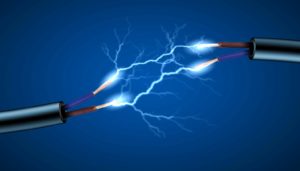Electrical Injuries Meeting Kit

It is important to be able to identify electrical hazards no matter if you are in general inducting, construction or farming. The majority of workplaces deal with hazards associated with electricity.
WHAT IS ELECTRIC SHOCK?
Electrical shock occurs when a person becomes part of an electrical circuit and the current passes through their body. A person becomes part of a circuit when they are in contact with an electrical current and a ground or an electrical current and another electrical current with a different voltage. Three primary factors affect the severity of the shock a person receives when he or she is a part of an electrical circuit:
- Amount of current flowing through the body (measured in amperes).
- Path of the current through the body.
- Length of time the body is in the circuit.
There are also secondary factors such as presence of moisture, state of the heart of the individual, and state of health of the individual that can affect the severity of the shock.
COMMON ELECTRICITY HAZARDS
The following are common mis-steps and sometimes deadly consequences have occurred in the following situations with workers.
- Failure to use electrical lockout devices
- Overloading circuits
- Opening up the case, or removing barrier guards, of any equipment that utilizes electricity
- Using any tools or a meter to measure for the presence of electricity
- Resetting a tripped circuit breaker, or replace a blown fuse
- Energized overhead powerlines
- Lightning
- Faulty equipment
- Working on energized equipment
- Improper grounding
- Damaged insulation
- Careless employees
- Outlets too close to conductors
- Torn or frayed cords and wires
- Working with exposed conductors carrying 50 volts or more
- Making repairs or alterations to any electrical equipment
ELECTRICAL INJURIES
There are four main types of electrical injuries:
- Electrocution (fatal)
- Electric shock
- Burns
- Falls caused as a result of contact with electrical energy
GENERAL SAFETY TIPS WORKING WITH OR NEAR ELECTRICITY
- Inspect portable cord-and-plug connected equipment, extension cords, power bars, and electrical fittings for damage or wear before each use. Repair or replace damaged equipment immediately.
- Always tape extension cords to walls or floors when necessary.
- Use extension cords or equipment that is rated for the level of amperage or wattage that you are using.
- Always use the correct size fuse. Replacing a fuse with one of a larger size can cause excessive currents in the wiring and possibly start a fire.
- Be aware that unusually warm or hot outlets or cords may be a sign that unsafe wiring conditions exists.
- Always use ladders made with non-conductive side rails (e.g., fibreglass) when working with or near electricity or power lines.
- Place halogen lights away from combustible materials such as cloths or curtains.
- Risk of electric shock is greater in areas that are wet or damp. Install Ground Fault Circuit Interrupters (GFCIs) as they will interrupt the electrical circuit before a current sufficient to cause death or serious injury occurs.
- Use a portable in-line Ground Fault Circuit Interrupter (GFCI) if you are not certain that the receptacle you are plugging your extension cord into is GFCI protected.
- Make sure that exposed receptacle boxes are made of non-conductive materials.
- Know where the panel and circuit breakers are located in case of an emergency.
- Label all circuit breakers and fuse boxes clearly. Each switch should be positively identified as to which outlet or appliance it is for.
- Do not use outlets or cords that have exposed wiring.
- Do not use portable cord-and-plug connected power tools if the guards are removed.
- Do not block access to panels and circuit breakers or fuse boxes.
- Do not touch a person or electrical apparatus in the event of an electrical incident. Always disconnect the power source first.
FINAL WORD
Electricity can be a friend or foe. At all times, electricity must be treated with respect. Electricity has changed the world with its many applications in every aspect of our lives.
Electrical repairs must be carried out only by persons who are qualified and authorized to do so. Makeshift repairs of electrical equipment have resulted in many deaths in the workplace. Remember, you are in danger of electrocution if testing and repairs are done incorrectly.